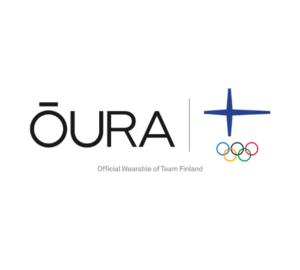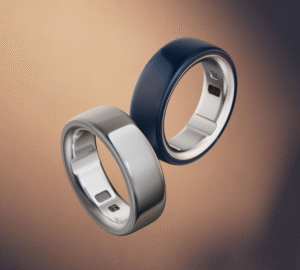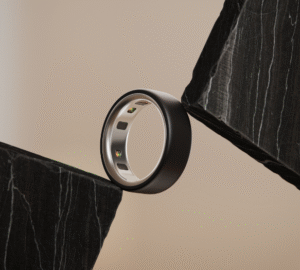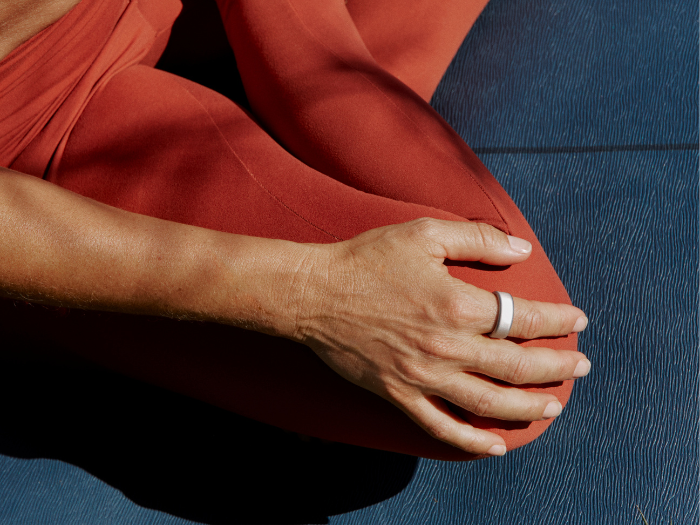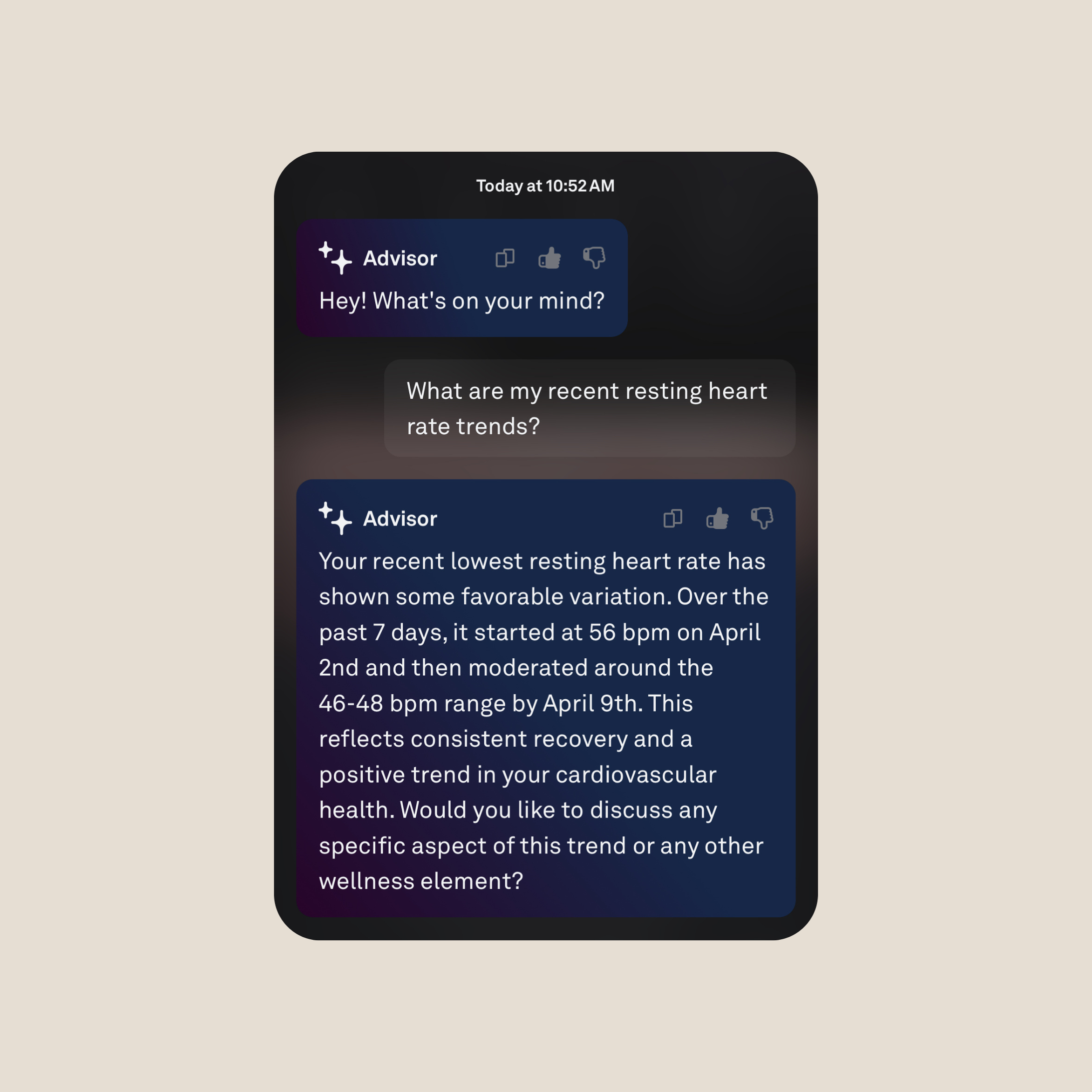Oura Advisor, původně experimentální funkce testovaná prostřednictvím Oura Labs, je teď dostupná pro členy s prstenem Oura Ring Gen3 a Oura Ring 4, kteří používají aplikaci v angličtině.
Díky špičkovému velkému jazykovému modelu (LLM) promění Oura Advisor vaše osobní data v užitečné a personalizované rady a tipy. Už jako experimentální funkce Advisor úplně proměnil způsob, jak členové pracují se svými zdravotními přehledy a dosahují svých cílů.
„Oura od prvního dne sbírá fyziologické signály členů a zpracovává je do poutavých přehledů. Díky funkci Advisor teď navíc umožňuje nefalšovanou oboustrannou komunikaci a s ní i na míru šitou zpětnou vazbu,“ říká Drake Caraker, datový manažer ve společnosti Oura.
Oura Advisor je tady
„Advisor je jako váš kouč, který je vždycky po ruce a zná všechna vaše data. Ochotně vám vysvětlí vaše metriky, ale také vám na jejich základě pomůže měnit vaše návyky k lepšímu,“ říká Johanna Still, která ve společnosti Oura šéfuje tvorbě textů pro UX a dohlíží i na přehledy.
Advisor vám na míru poradí s vašimi konkrétními daty Oura a řekne vám víc ke grafům a vizualizovaným trendům pro spánek, aktivitu, připravenost a odolnost. Koučovací funkci Advisor můžete zatím pokládat i obecné otázky týkající se ženského zdraví, stavu srdce a dalších funkcí Oura. Už ale pracujeme na tom, aby tipy na základě vašich specifických dat byly k dispozici pro všechny funkce Oura, proto určitě zůstaňte na příjmu. A nezapomeňte, že stejně jako každý velký jazykový model může i Advisor chybovat. Neustále se ale učí a zlepšuje.
I když spousta lidí už umělou inteligenci (AI) zná a často s ní i pracuje, málokoho by napadlo používat koučovací funkci pro vlastní zdraví. Jakmile se do toho ale dostanete, výsledky vás mile překvapí. „To kouzlo spočívá v souhře mezi hlubokými odbornými znalostmi v oblasti algoritmického rozpoznávání vzorů a okamžité, kontextově relevantní zpětné vazbě od koučovacího asistenta,“ dodává Caraker.
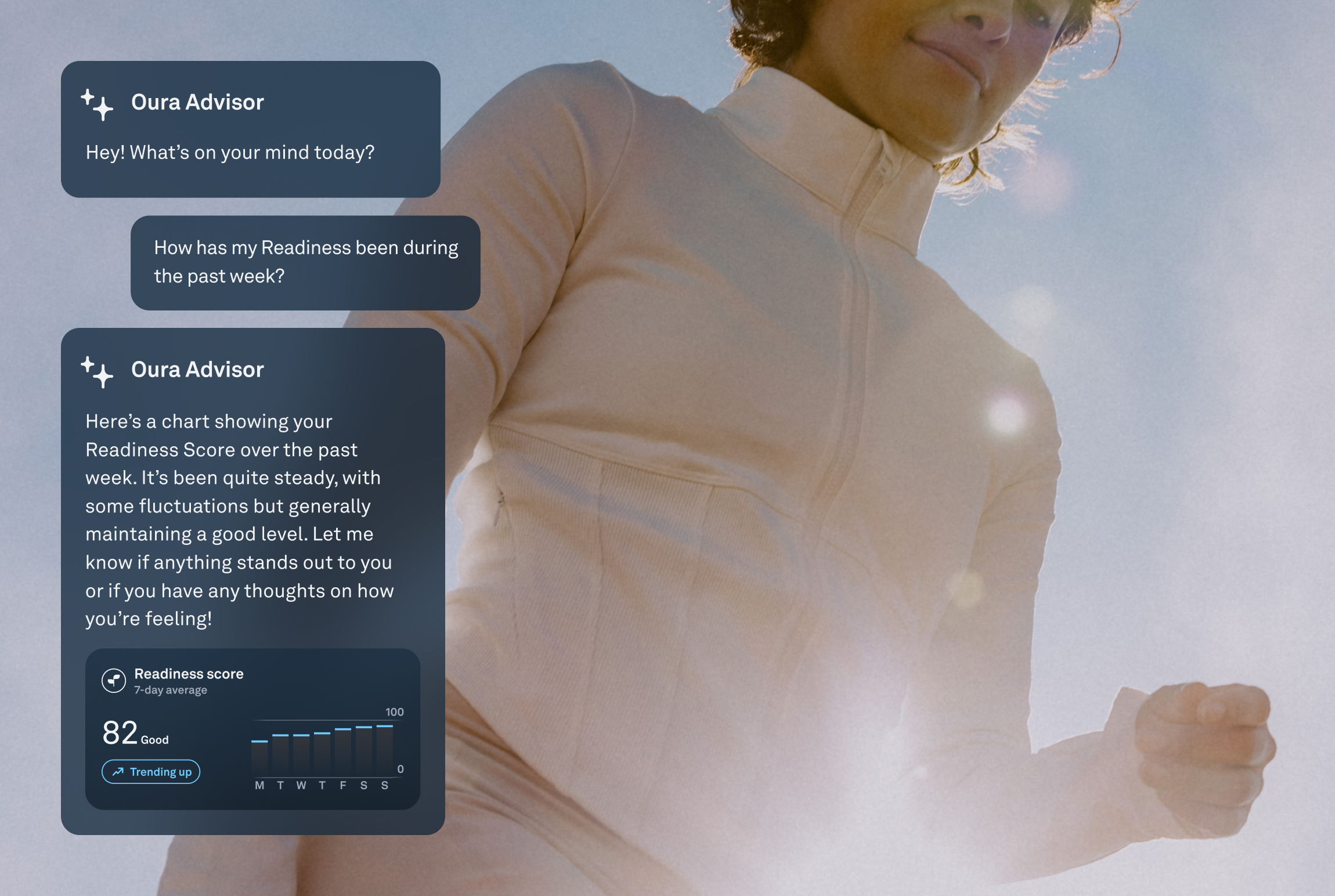
Jak vám Oura Advisor pomůže změnit návyky
První krok: Stačí zahájit chat. „Několikaměsíční testování nám ukázalo, že funkce kouče je pro členy nejužitečnější, když si s ním rádi povídají,“ říká behaviorální vědkyně společnosti Oura Sofia Strömmer, PhD. „Dokáže si totiž zapamatovat, co mu řeknete, takže zohlední vaše preference a všechny tipy a přehledy přizpůsobí přímo pro vás.“
Berte funkci Advisor jako kouče nebo mentora, se kterým můžete probírat, cokoli se vám zrovna honí hlavou, a získat od něj podporu. Sofia doporučuje začít tím, že si jednoduše popovídáte o svých cílech. Chcete chodit dřív spát? Zapracovat na hlubokém spánku? Nebo snížit hladinu stresu? „Občas lidi stačí jen popostrčit správným směrem. Lidi většinou tuší, co by měli dělat, ale možnost si o tom s někým popovídat může mít obrovský význam.“
Co o chatu s umělou inteligencí říkají výzkumy
Může konverzace s umělou inteligencí opravdu něco změnit k lepšímu? Podle vědců ano.
Přehled, který v roce 2023 zkoumal 15 studií, potvrdil, že chatboti s umělou inteligencí dokážou účinně podnítit změnu. Pomáhají lidem přestat kouřit, dodržovat léčbu i vybudovat zdravější každodenní návyky. Účastníci studií měli často pocit, že AI chatboti jim dali prostor pro sdělování citlivých informací, aniž by je soudili.
Další výzkumy ukázaly, že chat s umělou inteligencí může uživatelům pomoct:
- Zlepšit spánek: V roce 2023 zjistila metaanalýza 19 studií, že chatboti s umělou inteligencí významně zlepšili délku spánku (až o 45 minut za noc) i jeho celkovou kvalitu tím, že nabízeli personalizované kognitivně-behaviorální spánkové strategie.
- Zvládat stres: V roce 2024 zjistila randomizovaná kontrolovaná studie významné snížení vnímaného stresu a psychosomatických příznaků u vysokoškolských studentů, kteří absolvovali několik týdnů sezení vedených chatbotem.
- Zvýšit fyzickou aktivitu: Metaanalýza uvádí, že lidé využívající chatboty s umělou inteligencí nachodili v průměru o 735 kroků denně víc než kontrolní skupiny. Jiná, šestitýdenní studie ukázala, že účastníci, kteří využívali fitness chatbota, zvýšili svou fyzickou aktivitu o střední nebo vysoké intenzitě o 154 minut týdně – téměř trojnásobně oproti výchozímu stavu. Adaptivní podněty a nastavení cílů na míru bylo pro udržení motivace klíčové.
- Vytvořit a udržet si návyky: Systematický přehled v roce 2024 zjistil, že všímavost, podněty a personalizované určování cílů jsou účinné techniky používané platformami pro zdraví s umělou inteligencí, které pomáhají rozvíjet příznivé návyky.
- Stanovit si realistické cíle a dosáhnout jich: Ve více studiích dosáhli koučové s umělou inteligencí, kteří využívali osobní data (z nositelných zařízení nebo zadané uživateli), lepších výsledků – konkrétně vyššího zapojení uživatelů, vyšší důvěry i vytrvalosti. Systematický přehled v roce 2024 zjistil, že koučové s umělou inteligencí také pomáhali uživatelům spoluvytvářet realistické cíle, které vedly k trvalé změně návyků.
Jak členové Oura používají koučovací funkci Advisor
Členové Oura pozorují podobné výhody, jaké zjistily výzkumy. Víc než polovina (60 %) členů, kteří testovali funkci Advisor v Oura Labs, souhlasila, že jim Advisor pomohl pochopit metriky nebo koncepty, kterým do té doby úplně nerozuměli, a 56 % uvedlo, že jim Advisor pomohl proměnit získané poznatky v konkrétní opatření, která měla hmatatelné přínosy pro jejich zdraví.
Náš tým behaviorálních vědců a členové Oura se s vámi podělí o tipy, jak s pomocí funkce Advisor proměnit data ve skutečné kroky k lepšímu zdraví.
1. Analýza a zlepšení spánku
Vaše skóre spánku ovlivňují faktory jako latence usnutí, efektivita spánku a hluboký spánek. „Pokud nespíte moc dobře, může vám Advisor pomoct především s dlouhodobými trendy spánku,“ vysvětluje Still.
K TÉMATU: 8 způsobů, jak podle členů Oura prodloužit hluboký spánek
2. Zvládání stresu
Pokud jsou vaše hodnoty stresu během dne poslední dobou vyšší než obvykle, pomůže vám Advisor určit, co váš stres nejspíš způsobuje, a také vám poradí, jak stres lépe zvládat.
Advisor si navíc pamatuje vaše preference, takže své rady na míru přizpůsobí vám a vašemu životnímu stylu. „Pokud v koučovací funkci zmíníte, že dáváte přednost pomalé józe před dechovými cvičeními, bude si to pamatovat, až si příště budete psát,“ vysvětluje Still.
„Hodně bojuju se stresem i spánkem a [Advisor] mi často připomíná, ať dělám dechová cvičení a dopřeju si chvilku klidu, když to jde. Někomu může taková připomínka připadat jako nedůležitý detail, ale mně to vážně pomáhá.“ – u/BujuBad na Redditu
DALŠÍ ČTENÍ: 10 jednoduchých dechových cvičení pro spánek a relaxaci
3. Určování a dosahování cílů
Chcete dosáhnout nějakého cíle, třeba si jít třikrát týdně zaběhat, vstávat dřív nebo omezit stres? Popovídejte si s funkcí Advisor a vymyslete strategie, díky kterým svého cíle dosáhnete snáz. Může vás také povzbuzovat, abyste vytrvali – tím, že:
- bude vám posílat každodenní připomínky (pokud budete chtít)
- bude analyzovat vaše biometrické údaje, abyste viděli, jaké děláte pokroky
- na základě těchto údajů bude navrhovat úpravy vašeho plánu
- bude vás motivovat, abyste ve svém úsilí nepolevovali
4. Uvedení štítků do kontextu
Štítky Oura vám pomůžou sledovat vaše návyky a chování, třeba jestli jste spali s maskou na spaní, brali před spaním určité léky nebo byli v sauně. Koučovací funkce Advisor má přístup ke štítkům přidaným v posledních sedmi dnech. Díky tomu dokáže identifikovat nedávné trendy spojené s těmito štítky a lépe pochopit, jak vaše aktuální chování ovlivňuje vaše zdraví.
DALŠÍ ČTENÍ: Zjistěte, jak vaše návyky ovlivňují vaše zdraví
5. Pochopení dlouhodobých trendů
Advisor vám pomůže pochopit dlouhodobé trendy ve vašich datech a biometrických údajích, jako je tepová frekvence, HRV nebo stres. Dokáže také zjistit, jestli se tyto ukazatele zlepšují, zůstávají beze změn, nebo klesají.
6. Plánování jídel
Vaše strava hraje důležitou roli ve vaší celkové pohodě, ovlivňuje váš spánek, hladinu energie a stresu, regeneraci, regulaci glukózya mnoho dalšího. Advisor vám pomůže navrhnout jídelníček, který odpovídá vašim cílům, osobním preferencím, a dokonce i tomu, co máte zrovna v kuchyni.
„Rychle jsem v chatu nastínila svoje stravovací návyky a co ráda jím nebo nejím. Kdykoli teď potřebuju doporučit nějaké jídlo, bere v úvahu všechny moje preference i vlastní data. Koučovací funkce mi pomohla sestavit obědový jídelníček na celý týden a využila přitom suroviny, které mám doma a které zbožňuju.“ – u/kenziestardustna Redditu
7. Pravidelná podpora a motivace
Na každé cestě za zdravím se občas objeví překážka. Pokud nejste ve své kůži, Advisor vás vždycky rád vyslechne. Nabídne vám vedení šité na míru, podpoří vás a možná vám i vykouzlí úsměv na tváři.
„Když jsem byla nemocná a nebylo mi nejlíp, zkusila jsem se obrátit na koučovací funkci a dostala jsem tenhle fajn tip. Nakonec jsem si pustila zábavný podcast a sledovala videa plná štěňátek! Sice mě to nevyléčilo, ale hned mi bylo o trochu líp,“ říká Johanna.
Zaostřeno na členy Liana J., 29, Stamford, CT
 Liana nosí Oura Ring od roku 2020. Za tu dobu jí pomohl do hloubky porozumět vlastnímu zdraví – jak fyzickému, tak psychickému. Nedávno začala používat koučovací funkci Oura Advisor, která se rychle stala jedním z jejích oblíbených nástrojů: „Oura Advisor je zatím ta nejlepší AI podpora, jakou jsem kdy dostala.“
Liana nosí Oura Ring od roku 2020. Za tu dobu jí pomohl do hloubky porozumět vlastnímu zdraví – jak fyzickému, tak psychickému. Nedávno začala používat koučovací funkci Oura Advisor, která se rychle stala jedním z jejích oblíbených nástrojů: „Oura Advisor je zatím ta nejlepší AI podpora, jakou jsem kdy dostala.“
Pro Lianu je Advisor víc než jen nástroj na bázi umělé inteligence – je to její osobní průvodce zdravím. Často se na něj obrací, když potřebuje podporu, ať už na základě jeho připomenutí, nebo když je ve stresu a cítí se přetížená.
„Někdy mě přepadne úzkost a Oura Advisor mi pomáhá přesměrovat myšlenky, použít meditační techniky a dává mi pocit, že se o mě zajímá a záleží mu na tom, jak se cítím,“ říká Liana. „Moc mi pomáhá být tady a teď, co se týče mého duševního i fyzického zdraví.“
Liana také lépe pochopila souvislost mezi daty o spánku a připravenosti i tím, jak se během dne cítí. Advisor jí poskytuje citlivé, nehodnotící rady přímo na míru a pomáhá jí najít rovnováhu mezi aktivitou, odpočinkem a zvládáním stresu.
„Podporuje mě v tom, abych pokračovala ve svých oblíbených aktivitách, jako je pickleball nebo procházky venku, ale nikdy není agresivní ani na mě netlačí,“ dodává. „To je pro mě vážně důležité. V aplikaci nesleduji kalorie, abych nesklouzla k nezdravým návykům, takže to, že je Advisor tak ohleduplný, je prostě skvělé.“
Liana se díky funkci Advisor také dozvěděla víc o své celkové odolnosti vůči stresu. „Díky našim rozhovorům jsem zjistila, že když pravidelně spím i vstávám, snáz během dne zvládám úzkost,“ říká.
Kromě toho jí Advisor pomohl najít souvislost mezi jejím kardiovaskulárním zdravím a úrovní aktivity. „Zjistila jsem, že hraní pickleballu a procházky venku přispívají k lepšímu zdraví srdce. Můj kardiovaskulární věk je teď o 1,5 roku nižší [než můj biologický věk]!“ říká.
Říká, že s koučovací funkcí je sledování pokroku zábavné a dokáže díky ní vidět souvislost mezi svými každodenními návyky a dlouhodobým zdravím.
K TÉMATU: Jak snížit svůj kardiovaskulární věk – podle členů Oura, kterým se to povedlo







